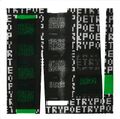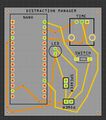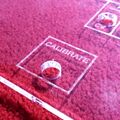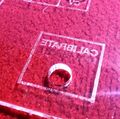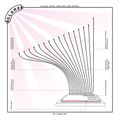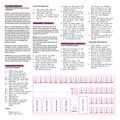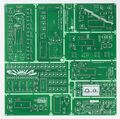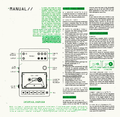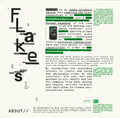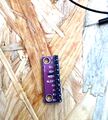Category:LFP: Difference between revisions
| Line 7: | Line 7: | ||
To encourage affection with the materiality of the blackbox we will create our own. Starting of by constructing the building blocks of a synthesizer, allowing the creation of complex outputs by interfacing/combining relatively simple operations. As a clear framework we will start off by working with sound, your [https://blog.medel.com/the-speed-of-hearing/ fastest sensor]. Compatible with the possibly familiar 'Eurorack' format (as developed by [http://www.doepfer.de/DIY/a100_diy.htm Doepfer]) we will be constructing several electronic modules that allow the output of one module to be the input for the next. Expanding upon the original discrete, or analog approach, each of our modules offer a programmable interface, eventually allowing for interfacing beyond the blackbox. | To encourage affection with the materiality of the blackbox we will create our own. Starting of by constructing the building blocks of a synthesizer, allowing the creation of complex outputs by interfacing/combining relatively simple operations. As a clear framework we will start off by working with sound, your [https://blog.medel.com/the-speed-of-hearing/ fastest sensor]. Compatible with the possibly familiar 'Eurorack' format (as developed by [http://www.doepfer.de/DIY/a100_diy.htm Doepfer]) we will be constructing several electronic modules that allow the output of one module to be the input for the next. Expanding upon the original discrete, or analog approach, each of our modules offer a programmable interface, eventually allowing for interfacing beyond the blackbox. | ||
As single modules perform one job and one job well, you will have to anticipate and even require the output of someone elses module in order for yours to work. Coinciding with your research we will create one or several 'outputs' consisting of an interface, electronics and a manual. | |||
=== Guests === | === Guests === | ||
Revision as of 22:29, 8 September 2019
Low Frequency Publication
Materialising the Blackbox
Introduction
In this special issue we will explore the physicality behind slick black boxes as for example found in everyone's pockets today. Be it hardware or software. The goal is to make the interactions, interfaces and connections explicit through hands-on research and play. Informed by the fact all modern day electronics still adhere to the paradigm of modularity, like the earliest computer designs we will collaboratively build one or more devices that explore notions of modularity, complexity/simplicity, interfaces, darkpatterns, input/output while explicitly giving insight into the black box, but this time including a manual.
To encourage affection with the materiality of the blackbox we will create our own. Starting of by constructing the building blocks of a synthesizer, allowing the creation of complex outputs by interfacing/combining relatively simple operations. As a clear framework we will start off by working with sound, your fastest sensor. Compatible with the possibly familiar 'Eurorack' format (as developed by Doepfer) we will be constructing several electronic modules that allow the output of one module to be the input for the next. Expanding upon the original discrete, or analog approach, each of our modules offer a programmable interface, eventually allowing for interfacing beyond the blackbox.
As single modules perform one job and one job well, you will have to anticipate and even require the output of someone elses module in order for yours to work. Coinciding with your research we will create one or several 'outputs' consisting of an interface, electronics and a manual.
Guests
Dennis de Bel Dennis de Bel (1984, NL) is an applied artistic researcher, educator, radio amateur (call sign PD0WNED). In his practice he positions himself as producer, consumer, observer and distributor of critical knowledge focussed on technology. His work has been exhibited at Siggraph Los Angeles, Transmediale Berlin and hosted workshops in various collaborations at, for example, ISEA Hong Kong, Radical Networks New York. He participated in the Relearn summer schools and Libre Graphics Meetings besides being a guest tutor at the Design Academy Eindhoven and the Willem de Kooning Academy Rotterdam University of Applied Science. In 2017 he co-founded Varia, a Rotterdam based space for developing collective approaches towards everyday technology. De Bel holds a MA from the Piet Zwart Institute (NL) and most recently (Jul-Dec 2018) participated in the artist in residency program of the Institute for Provocation in Beijing.
Ollie
de Player
Martin Howse
Schedule
The program consists of three main sections.
Building
Getting your hands dirty.
Interfacing
Basics of arduino, interfacing with others, desiging interfaces (frontpanels)
Publishing
Going public, manual
Resources
Software
Arduino Firmware
Hardware
Gerbers, Frontpanel templates,
Shops
Pads
Reading/Watching/Listening List
Pages in category "LFP"
The following 22 pages are in this category, out of 22 total.
E
Media in category "LFP"
The following 170 files are in this category, out of 170 total.
- 20190928 150755 copy.jpg 1,547 × 2,268; 2.43 MB
- 20191022 214700.jpg 2,268 × 1,276; 1.76 MB
- 20191030 140218.jpg 2,268 × 1,276; 1.95 MB
- 20191030 140236.jpg 2,551 × 1,435; 2.06 MB
- 20191030 140315.jpg 1,701 × 957; 1.13 MB
- 20191119 153708.jpg 2,551 × 1,435; 1.98 MB
- 20191205 164856.jpg 1,116 × 1,984; 1.13 MB
- 20191215 144305.jpg 2,268 × 1,276; 1.62 MB
- 20200220 171912.jpg 1,701 × 957; 750 KB
- 7 manual.jpg 800 × 794; 498 KB
- 777.jpg 1,000 × 767; 350 KB
- 7tv.jpg 1,595 × 1,181; 1.15 MB
- Additive synthesis.jpg 650 × 137; 8 KB
- Alien.jpg 720 × 540; 705 KB
- Ardiono.jpg 3,264 × 1,836; 1.52 MB
- Baby-drummer.jpg 720 × 540; 704 KB
- Begena.jpg 266 × 421; 37 KB
- Bibi1.mp3 ; 15 KB
- Bibi2.mp3 ; 27 KB
- Caligo.mp3 ; 52 KB
- Catdogmouse.gif 640 × 400; 451 KB
- Clap&grime.mp3 ; 90 KB
- Clpngmusic.jpg 600 × 308; 81 KB
- Compressor.gif 244 × 140; 1.33 MB
- Dagger.jpg 960 × 714; 227 KB
- Democratic composition.jpg 868 × 1,280; 51 KB
- Digital oscilloscope.gif 400 × 225; 3.1 MB
- Distraction manager pcb.JPG 375 × 426; 34 KB
- Dmf air.jpg 1,280 × 960; 143 KB
- Dmf trailer.jpg 1,280 × 960; 70 KB
- Dmf window.jpg 1,280 × 960; 117 KB
- DP1.jpeg 1,800 × 1,200; 533 KB
- DP2.jpeg 1,000 × 667; 637 KB
- Final Glare.jpg 540 × 960; 130 KB
- Fish-bell.jpg 720 × 540; 698 KB
- Fork.jpg 720 × 540; 699 KB
- Frontpanel1.jpg 1,457 × 766; 327 KB
- Frontpanel2.jpg 1,836 × 1,832; 686 KB
- Frontpanel3.jpg 1,836 × 1,814; 836 KB
- Gifcdm.gif 400 × 533; 809 KB
- GLARE Cover 1-03.png 2,150 × 1,071; 39 KB
- Glare PCB.png 850 × 405; 450 KB
- GLARE publish 1.1.jpg 1,754 × 1,754; 366 KB
- GLARE publish 1.12.jpg 1,754 × 1,754; 815 KB
- GLARE sensors01.jpg 5,184 × 3,456; 680 KB
- Glare.png 3,508 × 3,508; 682 KB
- Granular synthscreen.jpg 2,268 × 1,276; 1.64 MB
- Gvrijonmega.jpg 1,134 × 2,016; 550 KB
- Gvrijonnano.jpg 1,134 × 2,016; 447 KB
- Hardwaretimers.jpg 2,408 × 850; 254 KB
- Impaktthursday2.jpg 2,268 × 4,032; 725 KB
- Impaktthursday4.jpg 2,268 × 1,276; 268 KB
- InaudiblePhenomena1.jpg 425 × 756; 136 KB
- InaudiblePhenomena2.jpg 425 × 756; 121 KB
- InaudiblePhenomena3.jpg 756 × 425; 156 KB
- InaudiblePhenomena4.jpg 425 × 756; 189 KB
- Introduction.png 635 × 299; 13 KB
- Kantele.jpg 506 × 144; 24 KB
- Kanteleplayers.jpg 1,024 × 769; 132 KB
- Klebeband.mp3 ; 48 KB
- Knob values.gif 700 × 323; 416 KB
- LDR.jpg 960 × 540; 356 KB
- Ldrarray1.jpg 567 × 1,008; 167 KB
- Ldrarray2.jpg 2,268 × 1,276; 401 KB
- LDRMega.jpg 2,056 × 1,371; 889 KB
- LDRray4.jpg 886 × 591; 620 KB
- LDRray6.jpg 591 × 886; 196 KB
- LFP 15.jpg 4,344 × 2,896; 329 KB
- LFP 18.jpg 5,184 × 3,456; 447 KB
- LFP 19.jpg 4,766 × 3,177; 371 KB
- LFP all 04.jpg 3,059 × 3,030; 956 KB
- LFP bird 12.jpg 3,411 × 5,116; 782 KB
- LFP bird 13.jpg 3,411 × 5,116; 725 KB
- LFP deplayer 02.jpg 1,000 × 667; 310 KB
- LFP deplayer 03 small.jpg 1,000 × 667; 485 KB
- LFP deplayer 06.jpg 1,000 × 667; 295 KB
- LFP deplayer 09.jpg 667 × 1,000; 345 KB
- LFP deplayer 11.jpg 1,000 × 667; 353 KB
- LFP deplayer 12.jpg 886 × 1,329; 969 KB
- LFP deplayer 21.jpg 1,000 × 667; 261 KB
- LFP deplayer 29.jpg 1,000 × 667; 378 KB
- LFP deplayer 30.jpg 1,000 × 1,500; 404 KB
- LFP detail 01.jpg 5,184 × 3,456; 851 KB
- LFP detail 02.jpg 5,184 × 3,456; 652 KB
- LFP detail 03.jpg 5,184 × 3,456; 973 KB
- LFP detail 27 small.jpg 1,800 × 1,200; 640 KB
- LFP detail 28.jpg 5,101 × 3,401; 307 KB
- LFP detail 29.jpg 5,162 × 3,441; 320 KB
- LFP detail 34.jpg 5,184 × 3,456; 904 KB
- LFP detail 35.jpg 5,184 × 3,456; 1,001 KB
- LFPoster1.jpg 1,836 × 3,264; 1,009 KB
- LFPoster2.jpg 3,264 × 1,836; 898 KB
- LFPoster3.jpg 3,264 × 1,836; 846 KB
- LFPoster4.jpg 1,836 × 3,264; 802 KB
- LFPoster5.jpg 1,836 × 3,264; 954 KB
- LFPoster6.jpg 3,264 × 1,836; 756 KB
- Lfpsesh2-code.png 2,110 × 688; 172 KB
- Love-tape.jpg 720 × 540; 695 KB
- Mark - Back.png 1,789 × 1,743; 1.78 MB
- Mark - Front.png 1,789 × 1,753; 1.33 MB
- Max DMF1.jpg 1,836 × 3,264; 1.62 MB
- Max DMF2.jpg 3,264 × 1,836; 2.52 MB
- Max DMF3.jpg 1,836 × 3,264; 2.49 MB
- Max DMF4.jpg 1,836 × 3,264; 2.59 MB
- Max DMF5.gif 480 × 640; 4.01 MB
- Max DMF6.jpg 3,264 × 1,836; 2.29 MB
- Max DMF7.gif 480 × 640; 2.45 MB
- Max DMF8.jpg 3,264 × 1,836; 2.09 MB
- Maxbreadboard1.jpg 2,268 × 1,276; 601 KB
- Maxconceptsketch1.jpg 1,134 × 2,016; 414 KB
- Maxconceptsketch2.jpg 1,134 × 2,016; 396 KB
- Meergranen s.gif 453 × 958; 351 KB
- Meergranen-db.jpg 4,000 × 3,000; 4.07 MB
- Meergranen-samples.png 1,548 × 878; 527 KB
- Meergranen1.jpg 3,264 × 2,448; 1.95 MB
- Meergranen2.jpg 2,448 × 3,264; 2.55 MB
- Meergranen3.jpg 2,448 × 3,264; 2.15 MB
- Mf1.jpeg 480 × 640; 116 KB
- Mf2.jpeg 480 × 640; 134 KB
- Mf3.jpeg 480 × 640; 111 KB
- Modular synth interface.jpg 2,268 × 1,515; 2.37 MB
- Motheremin.jpg 720 × 540; 836 KB
- Multiplexer1.jpg 2,268 × 2,520; 1,010 KB
- Multiplexer2.jpg 2,268 × 1,276; 801 KB
- Musicboxmodule.jpg 2,268 × 1,276; 2.03 MB
- MVDH speech-to-midi-counting.mp3 ; 351 KB
- Mystify understand.jpg 3,264 × 1,836; 2.73 MB
- Olli workshop.jpg 1,280 × 960; 112 KB
- OSC.gif 600 × 338; 1.49 MB
- PCBSchematic.png 1,951 × 923; 89 KB
- Pencil.jpg 720 × 540; 698 KB
- PosterSmallFinal.jpg 1,742 × 2,498; 585 KB
- Publication.gif 200 × 112; 419 KB
- Publication01.jpg 1,000 × 667; 286 KB
- Raspberry-p-3-bird.jpg 726 × 498; 249 KB
- S-Water.mp3 ; 843 KB
- S-Wood.mp3 ; 1.1 MB
- Screen Shot 2019-12-02 at 22.20.11.png 170 × 390; 14 KB
- Sensor plug.jpg 1,390 × 2,472; 675 KB
- Sensor synth.jpg 1,836 × 3,264; 856 KB
- Sensor.png 265 × 893; 10 KB
- SensorProto.jpg 1,836 × 3,264; 836 KB
- SensorTV.jpg 1,836 × 3,264; 669 KB
- Serial plotter.mp4 ; 2.47 MB
- Sess3 2.gif 480 × 640; 1.39 MB
- Sess3 5.jpg 1,836 × 3,264; 1.51 MB
- Sine.mp3 ; 48 KB
- Sine2.mp3 ; 119 KB
- Speech-instrument.jpg 1,417 × 823; 592 KB
- Stapletrigger2.jpg 3,264 × 1,836; 1.56 MB
- Stapletrigger3.jpg 1,836 × 3,264; 1.7 MB
- Stapletrigger4.jpg 3,264 × 1,836; 1.15 MB
- Subtractive-synthesis.png 830 × 299; 21 KB
- Super-in-low.jpg 720 × 540; 727 KB
- Svarog3.jpg 720 × 540; 698 KB
- Take time.jpg 960 × 1,280; 266 KB
- Teensy1.jpg 1,827 × 1,218; 877 KB
- Teensy2.jpg 1,224 × 700; 506 KB
- Testkeyboard1.jpg 2,268 × 1,276; 500 KB
- Tisa take time.mp3 ; 6 MB
- WorkshopOlli1.jpg 2,448 × 3,264; 2.17 MB
- WorkshopOlli2.jpg 3,264 × 2,448; 2.27 MB
- WorkshopOlli4.jpg 3,264 × 2,448; 2.19 MB
- WorkshopOlli5.jpg 3,264 × 2,448; 2.24 MB
- WorkshopOlli7.jpg 1,366 × 1,024; 325 KB
- XPUB - DE PLAYER - INPUT-OUTPUT176-12 december 2019.jpg 1,800 × 1,200; 559 KB
- XPUB - DE PLAYER - INPUT-OUTPUT292-12 december 2019.jpg 1,800 × 1,200; 563 KB
- XPUB - DE PLAYER - INPUT-OUTPUT300-12 december 2019.jpg 1,800 × 1,200; 614 KB
- XPUB - DE PLAYER - INPUT-OUTPUT43-12 december 2019.jpg 1,800 × 1,200; 610 KB
- XPUB workshop.jpg 4,128 × 2,322; 2.75 MB










